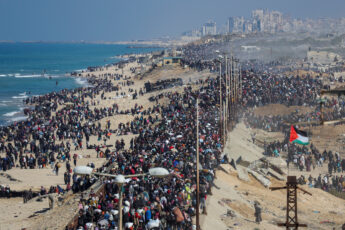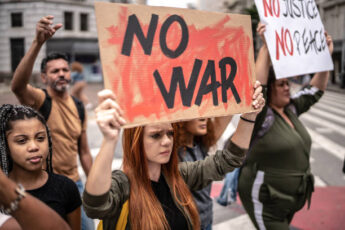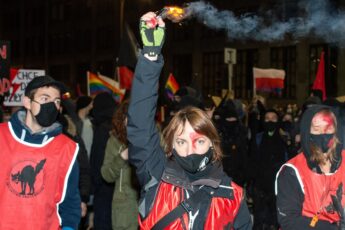
by PERMANENT ASSEMBLY AGAINST THE WAR
From the very beginning of the Russian invasion to Ukraine and the consequent escalation of confrontation between different capitalistic blocs, we see a race among nation-states to upgrade their geopolitical position participating in the Third World War. Greek and Turkish states are participating in the ongoing war, each one with its own strategy and with actions considered the most profitable for the “national interest”. Greece is fully siding with NATO and sending weapons to Ukraine. Turkey – second big army of NATO – took a more “neutral” position at the beginning of war trying to mediate between Russia and the West and then came down on the Western side for its own interests.
Both states have a history of war within and outside their national borders: Turkey with its invasions in Syria and northern Iraq, and its military management of the Kurdish population, while Greece with its participation in operations in the Middle East, Africa and the Balkans. Both countries are belligerently confronting social movements while jointly participating in the war against migrants.
In this context, the Greek and Turkish states brought the Greek-Turkish antagonism back to the fore: A rivalry that has lasted for decades and has several times taken on military characteristics. In recent months, the war spectacle has flooded our screens. On both sides of the Aegean, we hear daily about Greek or Turkish overflights over the national borders of the other country (in fact, “virtual” battles with the risk of a real accident), about the danger to the territorial integrity of each country, about the national rights we have to defend. And, of course, about the national unity we must show against the “enemy”. We know that none of this is true. The main points of the Greek-Turkish competition are the following: maritime boundaries, national airspace, EEZ and the demilitarization of the Aegean islands. Each side uses its own legal arguments in this dispute, the essence of which lies on the possibility of extracting hydrocarbons (which of course brings environmental disaster), but mainly on the control of trade and other passages, and the influence they exert. This in itself proves that we are not talking about some ‘right’ of one or the other state side, but about a battle in purely military, political and economic terms. Legal arguments are used instrumentally in the inter-capitalist competition between states. The issue is not legal; it is political, economic, and social. The fake legal rhetoric is used to fuel nationalist feelings.
The oppressed on both sides of the Aegean are already paying the price of the Greek-Turkish competition: increasing military expenditure which implies a reduction in social expenditure and the degradation of welfare structures; nationalism and militarism which, apart from the “national enemies”, are directed against social movements and, among other things, imply the rise of patriarchal and male violence, the belligerent treatment of migrants who are supposed to constitute a hybrid threat instrumentalised by the opposing state, which de facto entails border violence, pushbacks, murders and drownings at the borders and, finally, the encroaching militarisation of every aspect of social life in which any activity that disrupts the flows of profit and commodities is considered a threat to ‘national security’. After all, both states have already openly allied with fascist groups (e.g. during the warlike situation against migrants on Evros in March 2020) and have treated anyone opposing such militarisation, as traitor.
Migrants are those who are used as a political tool in every occasion under the authorization of the European Union. Turkey uses them as a blackmail tool in every occasion like the recent agreement signed between Turkey, Sweden and Finland withdrawing the veto on their NATO membership paving the way to the deportation of Kurdish asylum seekers living in these two countries and to attack North Eastern Syria with the authorization of the West. Meanwhile in Greece asylum seekers are coerced into violent, illegal pushback operations run by border police and other military forces.
We stand against the war on migrants by both Greece and Turkey and the war rhetoric between these two under the supervision of EU aimed to justify the escalation of militarization expenses with its direct consequences on people’s lives. The spectacle of war is being used to immobilize and confuse us: We must separate ourselves from the fetish of spectacle, which displays on our screens the threat of potential disaster so that we can be preoccupied by ignoring the complementary reality of the ongoing destruction around us, in order to act. In order to prevent the Greek-Turkish antagonism from escalating into an armed inter-state conflict, the social movements must now more than ever intensify their action. The social, feminist, anti-racist, anti-war, labour movements must come together and act both against the intensification of the war rhetorics and its consequences at every level: war against migrants, war against women and LGBTQI+ people to fight for a transnational politics of peace.





